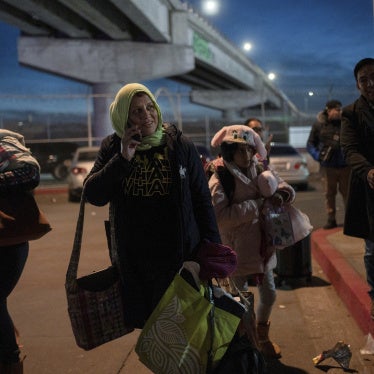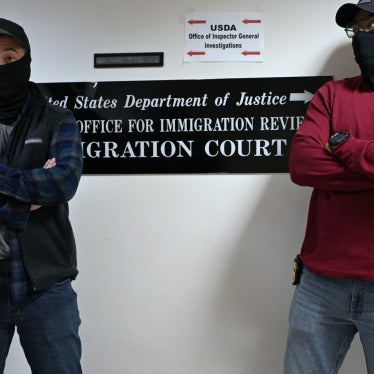July 1, 2025
VIA ELECTRONIC MAIL
Gianni Infantino President
Fédération Internationale de Football Association FIFA-Strasse 20, P.O. Box 8044 Zurich, Switzerland
Re: Impact of U.S. Immigration Policies on the 2025 FIFA Club World Cup and the 2026 FIFA Men’s World Cup
Dear Mr. Infantino:
The undersigned civil society organizations are writing to you to express our deep concern about current immigration policies and enforcement measures in the United States and their impact on the 2025 FIFA Club World Cup and the 2026 FIFA Men’s World Cup. Since the inauguration of President Trump in January 2025, the U.S. government has issued a series of repressive executive orders and enacted policy changes that violate both U.S. and international human rights law. These actions pose a serious threat to individuals—particularly non-citizens—traveling to or residing in the United States, including the estimated 1.5 million foreign visitors attending this summer’s Club World Cup and 2.6 million visitors projected to attend next summer’s Men’s World Cup. Increased immigration enforcement actions, abusive Immigration and Customs Enforcement (ICE) operations, and broader border restrictions have also contributed to widespread fear and uncertainty. Several foreign governments have already issued travel advisories to its citizens, warning of risks of being denied entry or detained and deported when traveling to the United States.
On May 5, 2025, Human Rights Watch wrote to you with their detailed concerns about U.S. immigration policies and requested information on the steps that FIFA is taking to ensure “that the U.S. government will permit players, fans and journalists from around the world to safely attend the 2026 World Cup,” including any steps FIFA is taking to advocate for “changes in policies to align with international human rights, FIFA’s Statutes, and FIFA’s Human Rights Policy.” FIFA’s response on June 3, 2025, did not meaningfully address any of the issues raised in Human Rights Watch’s letter, stating simply that “if FIFA becomes aware of potentially adverse human rights impacts…we will engage with the relevant authorities.”
This response ignores the clear evidence of the significant deterioration of the rights climate in the United States:
- Non-U.S. nationals traveling to or from the United States with prior authorization from the U.S. government are nevertheless at risk of arbitrary denial of entry, detention, and/or deportation;
- Individuals in the U.S. who express political opinions that diverge from those of the current administration are similarly at risk of arbitrary detention and/or deportation;
- Individuals in the U.S. are being arrested by disguised individuals and transferred to immigration detention sites and staging facilities where they are denied access to counsel and swiftly deported, while loved ones and their attorneys are unable to secure basic information about their whereabouts, in cases that may amount to enforced disappearances under international law;
- Conditions in U.S. immigration detention facilities expose detainees to a serious risk of cruel, inhuman, or degrading treatment;
- The U.S. government has arbitrarily designated certain groups of foreign nationals as alien enemies without presenting evidence, and has summarily deported them to El Salvador, where they are held incommunicado and in conditions that may amount to cruel, inhuman, and degrading treatment; and
- The U.S. government has also deported other third country nationals including asylum seekers and children to countries not their own, such as Panama and Costa Rica, after subjecting them to harsh detention conditions and denying them due process.
We urge FIFA to consider the broader context in which the tournaments are taking place, not just the accessibility and safety of teams and visitors. We draw your attention to a joint communication sent to United Nations human rights experts on June 6, 2025 by 27 U.S. civil society organizations and individuals, which contains detailed information regarding enforced disappearances and arbitrary detentions committed by the U.S. government. The communication notes that “U.S. authorities have engaged in a systematic campaign of abducting civilians across the country, imprisoning them in detention centers in the U.S. and abroad without due process” and that “the [U.S.] government openly broadcasts that they are targeting migrant communities, with arrest patterns that suggest racial profiling rather than targeting individuals on a legitimate legal basis.” As you are aware, many of the U.S. host cities for the World Cup are home to large immigrant populations. These communities now live in daily fear of detention, family separation, and deportation due to the U.S. government’s aggressive immigration enforcement policies.
On June 5, 2025, President Trump signed an Executive Order that fully restricts and limits the entry of nationals from twelve countries (Afghanistan, Burma, Chad, Republic of the Congo, Equatorial Guinea, Eritrea, Haiti, Iran, Libya, Somalia, Sudan, and Yemen) and partially restricts and limits the entry of nationals from another seven (Burundi, Cuba, Laos, Sierra Leone, Togo, Turkmenistan, and Venezuela). According to a U.S. State Department June 14 cable reviewed by The New York Times, a further 36 countries, most of them in Africa, may be added to the travel ban list. The ban currently exempts athletes and coaches traveling for the World Cup (and may, at the discretion of the Secretary of State, also exempt athletes and coaches traveling for the Club World Cup), but all or nearly all spectators from the banned countries—a list that perhaps will stay at 19 countries, but could be 54 or even more—will be barred from attending these FIFA events. Spectators from other countries remain subject to invasive and burdensome vetting procedures and the possibility of being denied travel authorization or entry due to their political or religious views.
FIFA has a responsibility to act. In its 2017 Human Rights Policy, FIFA declared that it would “seek[] to prevent or mitigate adverse human rights impacts that are directly linked to its operations, products or services by its business relationships, even if FIFA has not contributed to those impacts.” Further, FIFA committed to “exercise its leverage, and seek to increase said leverage where necessary, in connection with adverse human rights impacts arising through its business relationships.” The policy specifically identifies that “providing for the safety and security of people who are attending or are otherwise involved in or affected by FIFA’s events may impact certain fundamental human rights, such as freedom of movement, expression and assembly” as one of FIFA’s five salient human rights risks.
FIFA also has leverage. Under your leadership, FIFA is uniquely positioned to influence U.S. government policies that will impact people attending its tournaments. Your recent high-profile engagements with President Trump included attending his inauguration in January and joining him on a tour of the Gulf in May. Notably, in March, you were present in the White House when President Trump signed a Presidential Executive Order that provided for the institution of the White House Task Force on the FIFA World Cup 2026, established to “assist in the planning, organization, and execution of the events surrounding the 2025 FIFA Club World Cup and the 2026 FIFA World Cup.” On June 6, a post on the X (formerly Twitter) account of U.S. Customs and Border Protection (CBP) stated that their agents would be “suited and booted ready to provide security for the first round of games” of the Club World Cup, which began on June 14. As reported by The Athletic, the post was deleted after senior personnel from FIFA expressed concerns to the CBP about the reaction it had provoked.
The success of international events like the FIFA Club World Cup and FIFA Men’s World Cup depend not only on infrastructure and logistics, but also on the spirit of openness and safety extended to all who participate and attend. People of all nationalities should be able to travel to the United States without fear of arbitrary denial of entry, arbitrary detention, or deportation without due process; people in the United States should be able to exercise their right to freedom of expression without fear of arbitrary detention and deportation; and immigrant communities should not live in perpetual fear of CBP and ICE raids. If FIFA continues to stay silent, not only will millions be placed at risk, but the FIFA brand will also be used as a public relations tool to whitewash the reputation of an increasingly authoritarian government.
We call on FIFA to use its influence to encourage the U.S. government to guarantee the fundamental rights of the millions of foreign visitors and fans who seek entry to the United States to attend the tournaments, and the constitutional rights of the many immigrants who already live, work, and contribute meaningfully to the cities selected to host them. FIFA should publicly recognize the severity of the risks that U.S. government policies and practices pose to FIFA tournament attendees and migrant communities in the U.S. and publicly urge President Trump to reverse these policies and practices.
Sincerely,
Action Center on Race and the Economy Aiken County Branch NAACP
American Civil Liberties Union Amnesty International
Asian Americans Advancing Justice -- Atlanta Asian American Advocacy Fund
Atlanta Democratic Socialists of America Beyond the Bars
CASA in Georgia
Center for Human Rights and Constitutional Law Center for Victims of Torture
Central Florida Jobs With Justice
Centro de los Derechos del Migrante (CDM) Coalition of Latino Leaders (CLILA)
Color of Change Community Justice Project
Dignidad Inmigrante en Athens Equality California
Florida Immigrant Coalition Florida Student Power GALEO Impact Fund
Georgia Latino Alliance for Human Rights (GLAHR) Georgia Muslim Voter Project
Georgia Strategic Alliance for New Directions and Unified Policies (Georgia STAND-UP) Housing Justice League
Human Rights Watch
Jobs With Justice Education Fund Justice at Work
Los Angeles Alliance for a New Economy (LAANE) Missouri Workers Center
NAACP
New Disabled South New Labor
New York Immigration Coalition Philadelphia Jobs with Justice Pippin Project
Policing Alternatives & Diversion Initiative Puget Sound Sage
Refugee Women's Network Robert F. Kennedy Human Rights
Sant La Haitian Neighborhood Center Texas Young Active Labor Leaders Working Partnerships USA
Supporters groups
Angel City Valkyries Cloud 9 Supporters Club Doopin Delinquents Galactic Ambassadors Midnight Riders
Resurgence Supporters Group Timbers Army
Tulsa Lunatics
Labor organizations
Atlanta North Georgia Labor Council Dallas AFL-CIO Labor Council Florida AFL-CIO
Georgia State AFL-CIO
Greater Boston Labor Council AFL-CIO
Heat & Frost Insulators & Allied Workers, Local 22 IATSE District 14 - Florida
IATSE Local 31 - Kansas City
IATSE Local 51 - Houston/Galveston IATSE Local 127 - Dallas
IATSE Local 784 - San Francisco Bay Area IATSE Local 927 - Atlanta
Independent Drivers Guild
International Union Painters and Allied Trades (IUPAT) IUPAT District Council 78 - Florida
Massachusetts AFL-CIO
MLK Labor, AFL-CIO (King County, WA)
New York City Central Labor Council, AFL-CIO
Office and Professional Employees International Union (OPEIU) Local 153 - New York Philadelphia Council AFL-CIO
San Francisco Labor Council SEIU Local 32BJ
SEIU6 Property Services Northwest South Florida AFL-CIO
South Florida Labor Council for Latin American Advancement (LCLAA) Tarrant County Central Labor Council, AFL-CIO
Texas Gulf Coast Area Labor Federation, AFL-CIO
Texas AFL-CIO
UNITE HERE International Union UNITE HERE Local 2
UNITE HERE Local 8
UNITE HERE Local 19 - San Jose UNITE HERE Local 23 - Houston UNITE HERE Local 23 - Georgia UNITE HERE Local 26
UNITE HERE Local 274 - Philadelphia UNITE HERE Local 355
United Steelworkers (USW) Dallas Area SOAR Chapter 13-6 Washington State Labor Council, AFL-CIO








